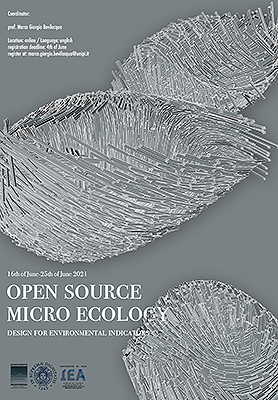 Workshop: Open Source Micro Ecology
Workshop: Open Source Micro Ecology
2021 June from 16th to 25th
- Coordinator: prof. Marco Giorgio Bevilacqua
- Visiting tutors:
- Venue: online
- Language: English
- Registration: send a mail to: Questo indirizzo email è protetto dagli spambots. È necessario abilitare JavaScript per vederlo.
- Registration deadline: 2021, June 4th
Currently, the construction industry is responsible for 50% of climate change factors, 40% of energy used globally and 50% of landfill waste, not to mention air, water, noise pollution and destruction of natural habitats.
Human development has highly affected the quality of our environment. Urban sprawl, deforestation, air contamination are active ingredients that contributed to the decline in biodiversity and a surge in numbers of species going extinct while other invasive species thrived. This workshop aims to switch the attention from a human-centred driven design to one that is bio-inclusive, proposing to take the creative and technical strategies of construction to endangered and affected species.
Birds are an indicator of environmental health and signal ecological disruptions much before humans take notice. More than that, are important because they keep systems in balance: they pollinate plants, disperse seeds, scavenge carcasses and recycle nutrients back into the earth.
Urban development has a marked effect on the ecological and behavioural traits of many living organisms, including birds.
The Open Source Micro Ecology workshop takes on the challenge to create a series of open source, easy to fabricate, modern bird houses that can create a safe haven for the local bird population and balance the local ecology as well as encourage biodiversity. This catalogue will serve to create a relational bridge between species, but also create world sharable knowledge and ecological strategies
Obiettivi del workshop:
- Introdurre gli studenti al concetto di design open source e disegno computazionale.
- Indagare e comprendere il tessuto ecologico locale e identificare potenziali opportunità di miglioramento.
- Creare un catalogo di famiglie di prodotti aperti, condivisibili e modificabili che possano crescere con il tempo.
- Introdurre gli studenti ai concetti di fabbricazione digitale e alla prototipazione rapida.
- Familiarizzare gli studenti con i concetti di strategie di resilienza post-antropogene.
- Integrare l’agenda sostenibile dell'università e creare una relazione con l'ambiente ecologico locale.
PROGRAMMA
- Giorno 1 (3h) – Martedì 16 Giugno
- Conferenza introduttiva (crisi climatica, biodiversità ed ecologia)
- Giorno 2 (8h) – Mercoledì 17 Giugno
- Analisi del contesto (identificazione delle specie e mappatura del tessuto urbano)
- Giorno 3 (8h) – Giovedì 18 Giugno
- Strumenti computazionali (sviluppo di competenze software)
- Giorno 4 (8h) – Venerdì 19 Giugno
- Analisi di progetto (parametri di temperatura, pioggia, rumore e posizione)
- Giorno 5 (4h) – Lunedi 22 Giugno
- Sviluppo del progetto individuale (idea iniziale)
- Giorno 6 (8h) – Martedì 23 Giugno
- Sviluppo del progetto (raffinamento del design e della fabbricazione)
- Giorno 7 (8h) – Mercoledì 24 Giugno
- Creazione della piattaforma open source (progetti finali)
- Giorno 8 (4h) – Giovedì 25 Giugno
- Presentazione finale e lancio della piattaforma




